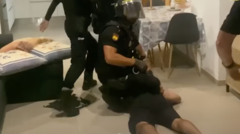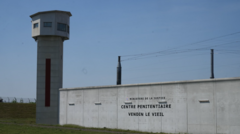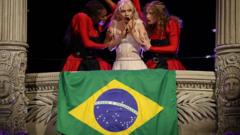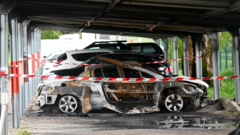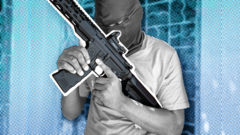In Rio's 'Israel Complex,' the Pure Third Command gang blends evangelical Christianity with drug trafficking, enforcing religious dominance while silencing other faiths in their territories. Former gang member Pastor Diego Nascimento illustrates the contradictions of being a criminal and a believer, as gang violence increasingly suppresses Afro-Brazilian religions.
Brazil's Dangerous Mixture of Crime and Faith: Rio's Gangsters as 'Soldiers of God'
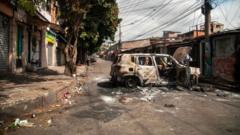
Brazil's Dangerous Mixture of Crime and Faith: Rio's Gangsters as 'Soldiers of God'
A look into how Rio de Janeiro's drug gangs intertwine evangelical beliefs with the brutal realities of crime, impacting local communities and religious freedoms.
Despite the physical and spiritual battle, local communities are caught in a perilous situation fueled by fear and crime. The intertwining of crime and faith raises profound questions about religious freedom and safety in Brazil.
The drug-trafficking Rio gangsters who see themselves as God's 'soldiers of crime'
When police in Rio de Janeiro confiscate significant quantities of illegal substances, they often discover drugs branded with religious insignia, particularly the Star of David. This emblem does not reflect Jewish heritage but is tied to specific Pentecostal beliefs related to the Second Coming of Christ that some followers maintain will coincide with Jews returning to Israel. The Pure Third Command, a formidable criminal organization in Rio, is responsible for this branding and is notorious for both violence against rival gangs and an infusion of evangelical Christian doctrine in their operations.
This gang has grown powerful enough to control five favelas in north Rio, now dubbed the Israel Complex, an area that symbolizes their religious and territorial claims. The gang’s leaders perceive themselves as "soldiers of crime," under the belief that Jesus is the sovereign of the land they oversee, hence the moniker "Narco-Pentecostals."
In stark contrast to this, Pastor Diego Nascimento's past life as a member of the Red Command gang echoes the complexity of faith and crime in Brazil. Initially entrenched in crime, Nascimento transformed his life through religion after hitting rock bottom due to his addiction to crack cocaine. He now mentors incarcerated individuals, guiding them toward spiritual reform. Yet, Nascimento contends that a genuine evangelical cannot simultaneously participate in criminal activities.
Compounding the issue, gangs in Rio engage in violent tactics to eliminate non-Christian belief systems from their territories, particularly Afro-Brazilian practices like Umbanda and Candomblé. Christina Vital, a sociology professor, emphasizes how these criminal organizations create an environment of fear and religious oppression, silencing beliefs contrary to their own interpretation of Christianity.
Furthermore, Dr. Rita Salim from the police's intolerance division highlights that the threats posed by these gangs are particularly fearsome due to their organized nature and the grip they have over local communities. Despite the rise of evangelical Christianity in Brazil, there are alarming trends of violence against alternative faiths, reflecting a broader, nationwide crisis.
Marcio de Jagun, a high priest and advocate for religious diversity, calls these assaults a form of "neo-Crusade," outlining an unsettling intersection of ethnic and religious bigotry. The history of crime and spirituality in Brazil cannot be overlooked, as past practices included relying on Afro-Brazilian deities and Catholic figures for protection.
As tensions escalate between crime and faith, the principles of religious freedom enshrined in Brazil's constitution remain in jeopardy, leaving communities vulnerable amidst the ruthless enforcement of gang doctrine—a vivacious blend of zealotry and violence that threatens the very fabric of society.
The drug-trafficking Rio gangsters who see themselves as God's 'soldiers of crime'
When police in Rio de Janeiro confiscate significant quantities of illegal substances, they often discover drugs branded with religious insignia, particularly the Star of David. This emblem does not reflect Jewish heritage but is tied to specific Pentecostal beliefs related to the Second Coming of Christ that some followers maintain will coincide with Jews returning to Israel. The Pure Third Command, a formidable criminal organization in Rio, is responsible for this branding and is notorious for both violence against rival gangs and an infusion of evangelical Christian doctrine in their operations.
This gang has grown powerful enough to control five favelas in north Rio, now dubbed the Israel Complex, an area that symbolizes their religious and territorial claims. The gang’s leaders perceive themselves as "soldiers of crime," under the belief that Jesus is the sovereign of the land they oversee, hence the moniker "Narco-Pentecostals."
In stark contrast to this, Pastor Diego Nascimento's past life as a member of the Red Command gang echoes the complexity of faith and crime in Brazil. Initially entrenched in crime, Nascimento transformed his life through religion after hitting rock bottom due to his addiction to crack cocaine. He now mentors incarcerated individuals, guiding them toward spiritual reform. Yet, Nascimento contends that a genuine evangelical cannot simultaneously participate in criminal activities.
Compounding the issue, gangs in Rio engage in violent tactics to eliminate non-Christian belief systems from their territories, particularly Afro-Brazilian practices like Umbanda and Candomblé. Christina Vital, a sociology professor, emphasizes how these criminal organizations create an environment of fear and religious oppression, silencing beliefs contrary to their own interpretation of Christianity.
Furthermore, Dr. Rita Salim from the police's intolerance division highlights that the threats posed by these gangs are particularly fearsome due to their organized nature and the grip they have over local communities. Despite the rise of evangelical Christianity in Brazil, there are alarming trends of violence against alternative faiths, reflecting a broader, nationwide crisis.
Marcio de Jagun, a high priest and advocate for religious diversity, calls these assaults a form of "neo-Crusade," outlining an unsettling intersection of ethnic and religious bigotry. The history of crime and spirituality in Brazil cannot be overlooked, as past practices included relying on Afro-Brazilian deities and Catholic figures for protection.
As tensions escalate between crime and faith, the principles of religious freedom enshrined in Brazil's constitution remain in jeopardy, leaving communities vulnerable amidst the ruthless enforcement of gang doctrine—a vivacious blend of zealotry and violence that threatens the very fabric of society.



